江苏省新沂市第二中学八年级英语下册 Unit 4 A good read Grammar 1教案 (新版)牛津版
- 格式:doc
- 大小:92.50 KB
- 文档页数:2
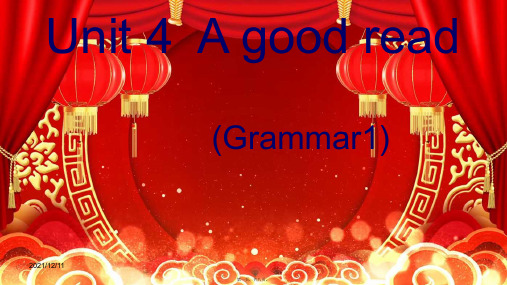

Unit 4 A good readReading (I)I. Teaching aims and learning objectivesBy the end of the lesson, the students should be able to:1. understand the extract from Gulliver’s Travels with the teacher’s help;2. understand the possible theme of the story;3. learn how to read a novel and develop a love for reading.II. Teaching contents1. New words and phrases: against, tie, over, stomach, until, finger, tiny, continue,either, manage, lift, army, must, unable, shoulder, by thetime, be tired out, be tied to, look down, the same size as,fall over, continue doing sth, manage to do sth, a huge armyof2. New structures: After our ship crashed against the rocks, I swam as fast as Icould.I woke up as the sun was rising.It moved up over my stomach and neck until it was standing near my face.However, they soon got up again and continued moving across my body.I tried to pull one hand free and finally managed to break the ropes.III. Focus of the lesson and predicted area of difficulty1. Get a full understanding of the whole story.2. Analysis the possible theme of the story.IV. Teaching proceduresStep 1 Lead-in1. An introduction to Gulliver’s Travels(1) The teacher asks the students some questions about reading:Do you like reading in your free time?/What kind of books would you like to read best?/...(2) The teacher introduces the novel Gulliver’s Travels and its author to thestudents with the help of pictures.2. Look and answerThe teacher shows students a picture and asks: What catches your eyes most in the picture?The possible answer can be: What impresses me most is the characters’sizes: the huge Gulliver and the small men.【设计意图:介绍作品与作者,根据小说篇名预测书中主角,并通过图片使学生认识到故事人物视觉形象上的强烈冲突。
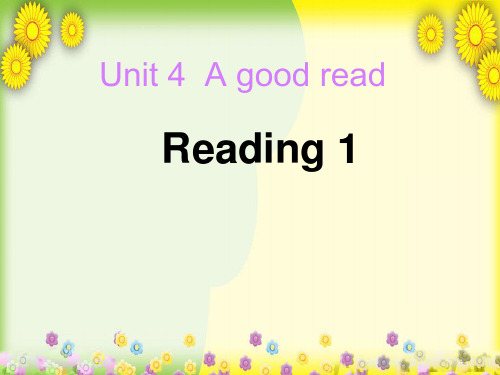
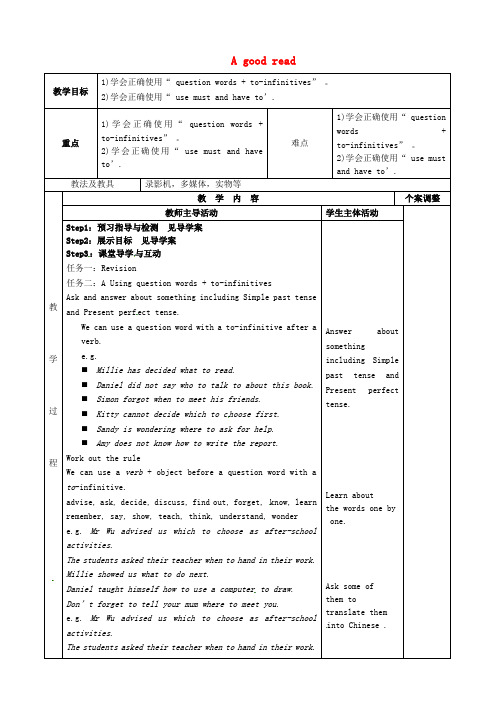
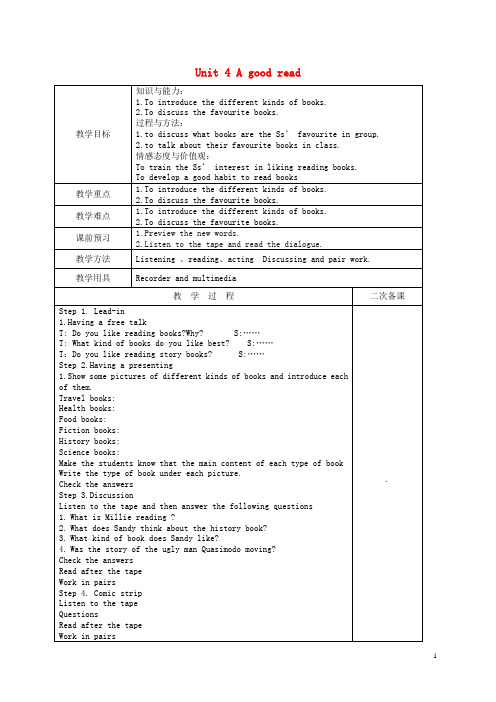
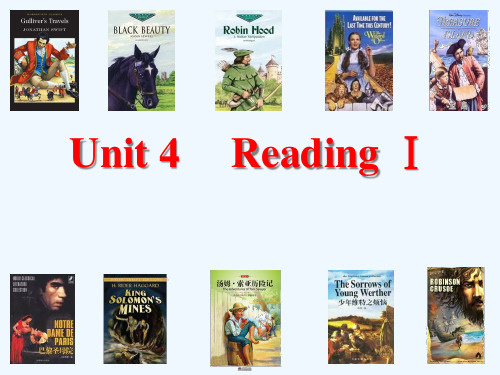
八年级英语下册Unit 4 A good read单元练习二(含答案)一、单项选择( )1. I can't decide_______.A. what to do itB. how shall I doC. how to do itD. what shall I do it( )2. The sweaters are so beautiful. I don't know_______.A. will buy whichB. which to buyC. which buyD. to buy which( )3. The family_______ stay at the hotel because it was raining hard.A. have toB. had toC. need toD. want to( )4. —Can you come to have dinner with me this evening?—I’m a fraid not. I _______ take care of my grandmother. She is ill.A. can’tB. have toC. mayD. could( )5. —Don’t give up, my children. Keep ________ and you will be successful.—Thank you, Mr. Wang. We’ll try our best.A. working onB. working offC. for workingD. to work( )6. —Lucy, let me help you fix your computer.—_______. I can manage it myself.A. That’s OKB. No, thanksC. Perhaps notD. Not at all( )7. In our school library, there are many books like English, Chinese, maths_______.A. for exampleB. and so onC. such asD. also( )8.I'm _______ building a new zoo because zoos are terrible places for animals to live in.A. againstB. onC. inD. for( )9. - We can't be successful unless we continue_______. -I agree with you.A. workB. to be workingC. to workingD. working( )10. —Dad, can I go to the cinema tonight?—Sure, but you come back home before 9 o’clock.A. CanB. mustC. mayD. might( )11. I find it play chess with you.A. interesting toB. interested toC. is interested toD. is interesting( ) 12. He three books recently. How about you?A. ReadsB. has readC. will readD. is reading( ) 13. —Is Mrs Liu a teacher with a lot of teaching _______ ?—Yes, she is. But she had some bad _______ at the beginning.A. experiences; experienceB. experience; experiencesC. experience; experienceD. experiences; experiences( ) 14. Before _______ the medicine (药), _______ should study the instructions or follow the doctor’s _______ .A. you take; you; adviseB. you take; one; adviceC. taking; one; adviceD. taking; you; advise( ) 15. —Bob called to say welcome back.—Really? _______.A. It’s OKB. You’re welcomeC. Thanks for telling meD. It doesn’t matter二、单项选择According to(根据)a new American study,having dinner with children may help to reduce(减少)the number ofproblems in parent—child communication.The 1 was done on about 5,000 middle school students in Chicago schools.The experts study the students at the beginning and the end of sixth grade and again at "he end of seventh and eighth grades.They asked the students 2 they ate dinner with their parent s and 3 asked how often their parents had a talk with them that lasted more than 10 4 ,praised(表扬)them when they did well,asked them where they were going and asked what they were doing in school.The study 5 that children who often ate dinner with their parents had 6 problems of communicating than children who 7 ate dinner with their parents.“Family meals are a good chance(机会)to keep in 8 with children,"said Jayne,a member of the study team.“You can get to know what’s going on in their lives better."However,she also 9 that parents choose suitable themes.Themes 10 grades and homework.are not good choices(选择).( )1.A.report B.study C.plan D.communication( )2.A.what B.how C.how often D.how much( )3.A.also B.even C.ever D.either( )4.A.seconds B.minutes C.hours D.days( )5.A.said B.thought C.hoped D.showed( )6.A.fewer B.more C.many D.much( )7.A.often B.always C.seldom D.usually( )8.A.party B.way C.meal D.touch( )9.A.agreed B.believed C.advised D.called( )10.A.for B.1ike C.with D.from三、阅读理解AAmericans with small families own a small car or a large one. If both parents are working, they usually have two cars. When the family is large, one of the cars is sold and they will buy a van(住房汽车).A small car can hold(容纳)four persons and a large car can hold six persons but it is very crowded. A van holds seven persons easily, so a family with three children can ask their grandparents to travel together.Mr. King and his wife had a third child last year. This made them sell a second car and buy a van. There are seven seats in the van, and two of them are used to put things on, for a family of five must carry many suitcases (手提箱)when they travel. When they arrive at their grandparen ts’ home, the suitcases are put into the two seats. And then they can carry their grandparents.Americans call vans motor homes. A motor homes is always used for holidays. When a family are travelling to the mountains or to the seaside, they can live in their motor home for a few days or weeks. All the members of a big family can enjoy a happier life when they are travelling together. That is why motor homes have become very popular. In America there are many parks for motor homes.( )1. From the passage we can learn that a big American family usually _______.A. travel together by vanB. live togetherC. live in a vanD. has three cars( )2. After Mr. King and his wife had a third child, first they ______.A. bought a vanB. sold one of their old carsC. moved to their grandparents houseD. got many suitcases( )3. A motor home is usually owned by a big family with ______.A. much moneyB. interest in travelingC. two carsD. a big house( )4. The last sentence“ In America there are many parks for motor homes.” in this passage means“_____”.A. American families like to visit parksB. There are many beautiful parks in AmericaC. Vans can be parked in many places in AmericaD. Motor homes can be bought in many places in America( )5. Americans usually drive motor homes to ________.A. visit their grandparents at weekendsB. take their children to school every dayC. travel with their family members for a holidayD. do some shopping with their family membersBLike many people, I have no clear idea about heroes. At some point, we all wonder if we need a hero and what a hero really is.Although there are a lot of differences in cultures, heroes around the world generally share a number of characteristics (特点) which give us courage and make us want to learn from them.A hero does something worth(值得) talking about. A hero has a special story to tell and people think highly of it. But a hero is not just the person with great fame (声誉) .A hero has powers (力量) larger than himself. Some people want to live like a hero, and they have to experience life with new and further meaning. A sure test for would-be heroes is what or whom they serve. What do they want to live and die for? If the answer suggests they serve only their own fame, they may be famous persons but not heroesA hero has a vision from the mountain top. He has the power to move people. He creates new possibilities. Without Gandhi, India might still be part of Britain. Without Martin Luther King, Jr., Americans might take different buses, eat in different restaurants, go for walks in different parks, and shop in different stores because of the different colours of their skin.There might be changes in society without a hero, but the speed of change would be rather slow. Thanks to heroes in history, they make the society develop so rapidly.( )6. According to this passage, a hero is a person who always___________.A. gives us courageB. thinks highly of othersC. shares great fameD. stands on the mountaintop( )7. If you want to live like a hero, you should___________.A. experience a new and meaningful lifeB. listen to something worth talking aboutC. serve your own fame and try to be famousD. know where and how you want to live and die ( )8. The underlined word “vision” in the passage means___________.A. 风景B. 想象C. 远见D. 形象( )9. Black people in America used to________ before Martin Luther King, Jr.A. shop at the white’s storesB. drive buses with the whiteC. take walks in the white’s parksD. eat in restaurants without the white( )10. What can we learn from the passage?A. We don’t need heroes anymore at so me point now.B. Heroes are all the same though different in cultures.C. People get power from heroes to move to a new place.D. Our society has developed faster because of heroes in history.CJohn and Sam were friends. They opened a small shop in a small village. One day, they sold out of all their wine (酒), so they drove to the city to buy some.On their way home, the wind was strong and it was getting colder and colder. Both John and Sam wanted to drink some wine to keep warm, but they had a r ule. They couldn’t drink any wine because they had to sell it. Because of the rule, if someone wanted to drink some wine, he had to pay the other twice the price.John was a clever man. He took out ten cents and gave it to Sam. He said, ‘Here is ten c ents. Would you please sell me some of your wine?’ Sam was a businessman (商人), so he said, ‘You give me money, so of course I will sell some to you.’ Then he passed John a cup of wine.After drinking the wine, John felt warm soon, but Sam was still cold. Then he took out the ten cents that John just gave to him and said to John, ‘Here is ten cents. Please sell me some of your wine.’ John agreed. Sam drank some wine and also felt much warmer. But after some time, they both felt cold again, so they kept buying wine from each other with the same ten cents. Soon they drank up all of the wine.‘How could so much wine only cost ten cents?’ the two friends asked each other.( )11. What did Sam and John do?A. They were doctors.B. They were officers.C. They were shopkeepers.D. They were policemen.( )12. What was the weather like when Sam and John went to buy some wine?A. It was sunny and warm.B. It was rainy and cold.C. It was rainy and snowy.D. It was windy and cold.( )13. How much did Sam and John spend on all of the wine?A. Five cents.B. Ten cents.C. Fifteen cents.D. Fifty cents.( )14. Which of the following is TRUE according to the passage?A. Sam and John walked to the city to buy some wine.B. Sam and John spent ten cents on getting some wine from the city.C. Sam and John drank all of the wine because they wanted to keep warm.D. Sam and John would be very happy when they got home.( )15. What’s the best title for this passage?A. Two Men on the Way HomeB. Some Cheap WineC. The Bad WeatherD. A Small Shop四、单词拼写A)根据句意和汉语注释,写出单词的正确形式1. I don't have much ___________(空闲)time for my hobby.2. Reading can help us improve our ____________(知识)of the world around us.3. We all think your ___________(建议)is very useful, so we will take it.4. They caught the child and ___________(捆绑)him to a chair with a rope.5. ---I always take a walk after supper. ---Do you? It's really a good __________(习惯).6. There is a big square __________(在……对面)our school.7. The story of the man Quasimodo really __________(感动)me, so I cried.B)根据对话内容,写出单词的正确形式8. --- What did you_______ with your old computer?--- Oh, I sent it to my cousin. He needs it very much.9. ---Keep going, Mandy! We almost arrive at the top of the mountain.---I can't. I am_______ out.10. ---This dog is really_______. I don't know who will buy it.五.句型转换1.His bag is big and my bag is big too.(同义句转换)My bag is_________ _________ _________ as his bag.2.. That man was tiny and ugly. (对画线部分提问)________ _______ that man?3. I found I could not move.I found _____________ ___________ for me to move.(同义句转换)4. How will he deal with those desks? (改为同义句)_______ will he _______ _______ those desks?5. Must I learn all these words by heart?(作否定回答)No, you _______ _______ _______.六、翻译句子1. 在一次坐火车去北京的路途中,那个法国人第一次听说中国四大名著。
8B Unit 4 ReadingGulliver in Lilliput (Period One)Teaching ObjectivesKnowledge: By the end of the class, Ss are expected to1. Learn the new words and expressions in the story;2. Understand the general idea of the story;Skills: By the end of the class, Ss are expected to1. Improve the ability of skimming the story fo r the main idea, scanning the story for specific information and readi ng carefully for more details;2. Appreciate and experience the beauty of the text by acting creatively.3. imagine different endings of the story.Affection, Attitude and Cultural Awareness: By the end of the class, Ss are expected to be brave and optimistic, imaginative and creative, and resp ect every life in the w orld.Teaching aidsBlackboard; Multi-mediaTeaching proceduresStep1. Lead-inEnjoy a video.Step 2. Pre-readingTask 1:Look and learn.Task 2: Read and match .Step 3:While-readingTask 1:T or FTask 2:Read and answer.Task 3:Read the story carefully and match the events with their causes.Step 4:Post-readingTask1:Try to retell the story.Task2:DiscussionStep 5:Homework1. Write a short passage to present Ss’ ideas.(If Gulliver could run away, what would he do? If Gulliver couldn’t run away, what would happen next?)2. Read the book of Gulliver’s Travels.。
A good read
教学目标1)学会正确使用“ question words + to-infinitives”。
2)学会正确使用“ use must and have to’.
重点1)学会正确使用“ question words +
to-infinitives”。
2)学会正确使用“use must and have
to’.
难点
1)学会正确使用“ question
words +
to-infinitives”。
2)学会正确使用“ use must
and have to’.
教法及教具录影机,多媒体,实物等
教学过程
教学内容个案调整
教师主导活动学生主体活动
Step1:预习指导与检测见导学案
Step2:展示目标见导学案
Step3:课堂导学与互动
任务一:Revision
任务二:A Using question words + to-infinitives
Ask and answer about something including Simple past tense
and Present perf ect tense.
We can use a question word with a to-infinitive after a
verb.
e.g.
⏹Millie has decided what to read.
⏹Daniel did not say who to talk to about this book.
⏹Simon forgot when to meet his friends.
⏹Kitty cannot decide which to choose first.
⏹Sandy is wondering where to ask for help.
⏹Amy does not know how to write the report.
Work out the rule
We can use a verb + object before a question word with a
to-infinitive.
advise, ask, decide, discuss, find out, forget, know, learn
remember, say, show, teach, think, understand, wonder
e.g. Mr Wu advised us which to choose as after-school
activities.
The students asked their teacher when to hand in their work.
Millie showed us what to do next.
Daniel taught himself how to use a computer to draw.
Don’t forget to tell your mum where to meet you.
e.g. Mr Wu advised us which to choose as after-school
activities.
The students asked their teacher when to hand in their work.
Answer about
something
including Simple
past tense and
Present perfect
tense.
Learn about
the words one by
one.
Ask some of
them to
translate them
into Chinese .
Millie showed us what to do next.
Daniel taught himself how to use a computer to draw. Don’t forget to tell your mum where to meet you.
We can also use an adjective like sure or clear before a question word.
e.g. Suzy was not sure who to ask for help.
Are you clear when to meet at the gate tomorrow?
疑问词+动词不定式做动词的宾语。
疑问词也包括疑问代词what, which, who和疑问副词how, when, where。
常和此结构连用的动词及动词短语有:know, learn, see, hear, ask, tell, decide, explain, find out, forget, remember, understand 等。
任务三:Amy and Daniel are talking about their Reading Week. Complete their conversation. Use the correct question words and to-infinitives (Page55). Turn to page 135 to read the explaina-t ion.
板书设计
疑问词+动词不定式做动词的宾语。
疑问词也包括疑问代词what, which, who和疑问副词how, when, where。
常和此结构连用的动词及动词短语有:k now, learn, see, hear, ask, tell, decide, explain, find out, forget, remember, understand 等.
教学札记。